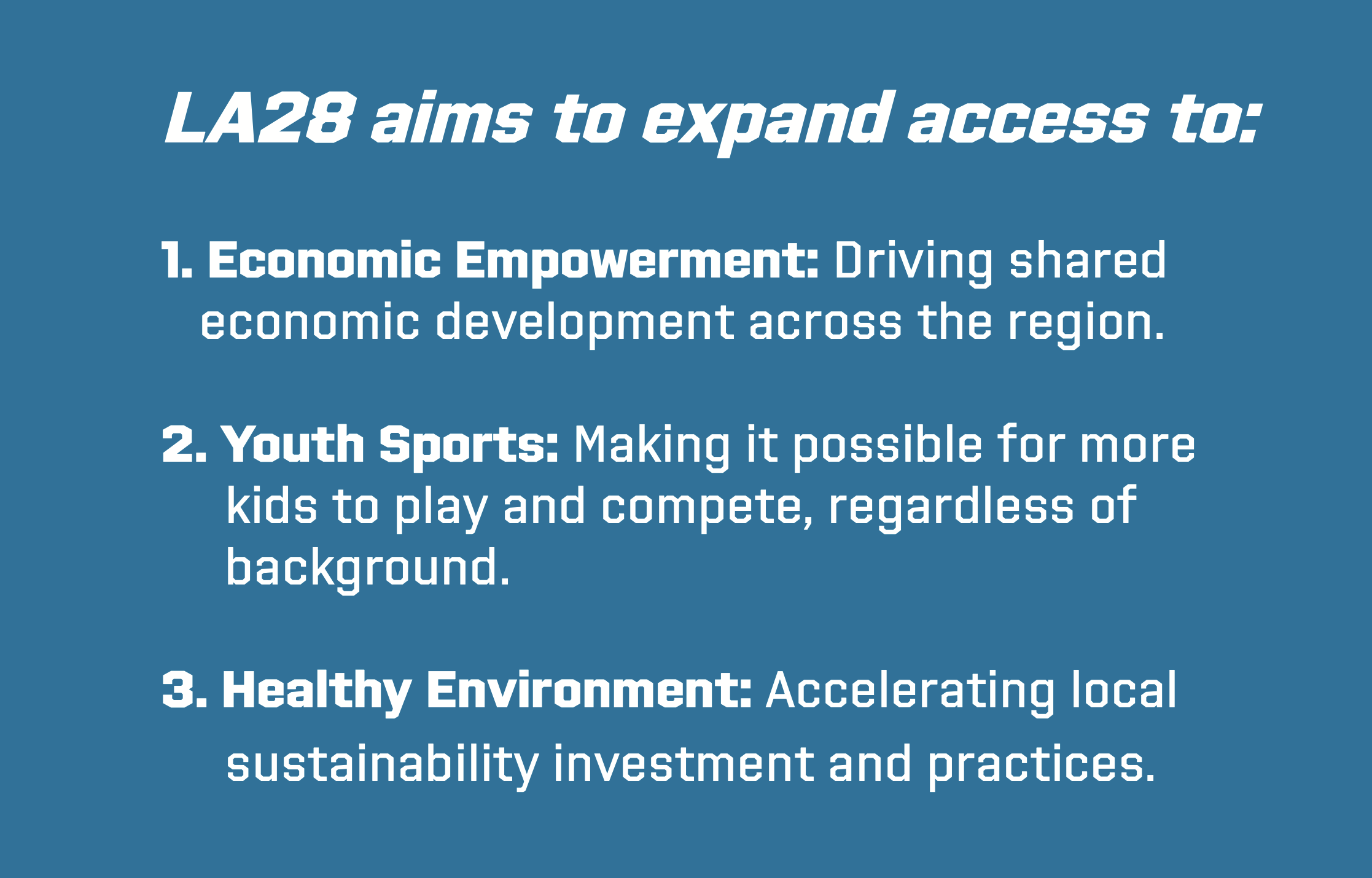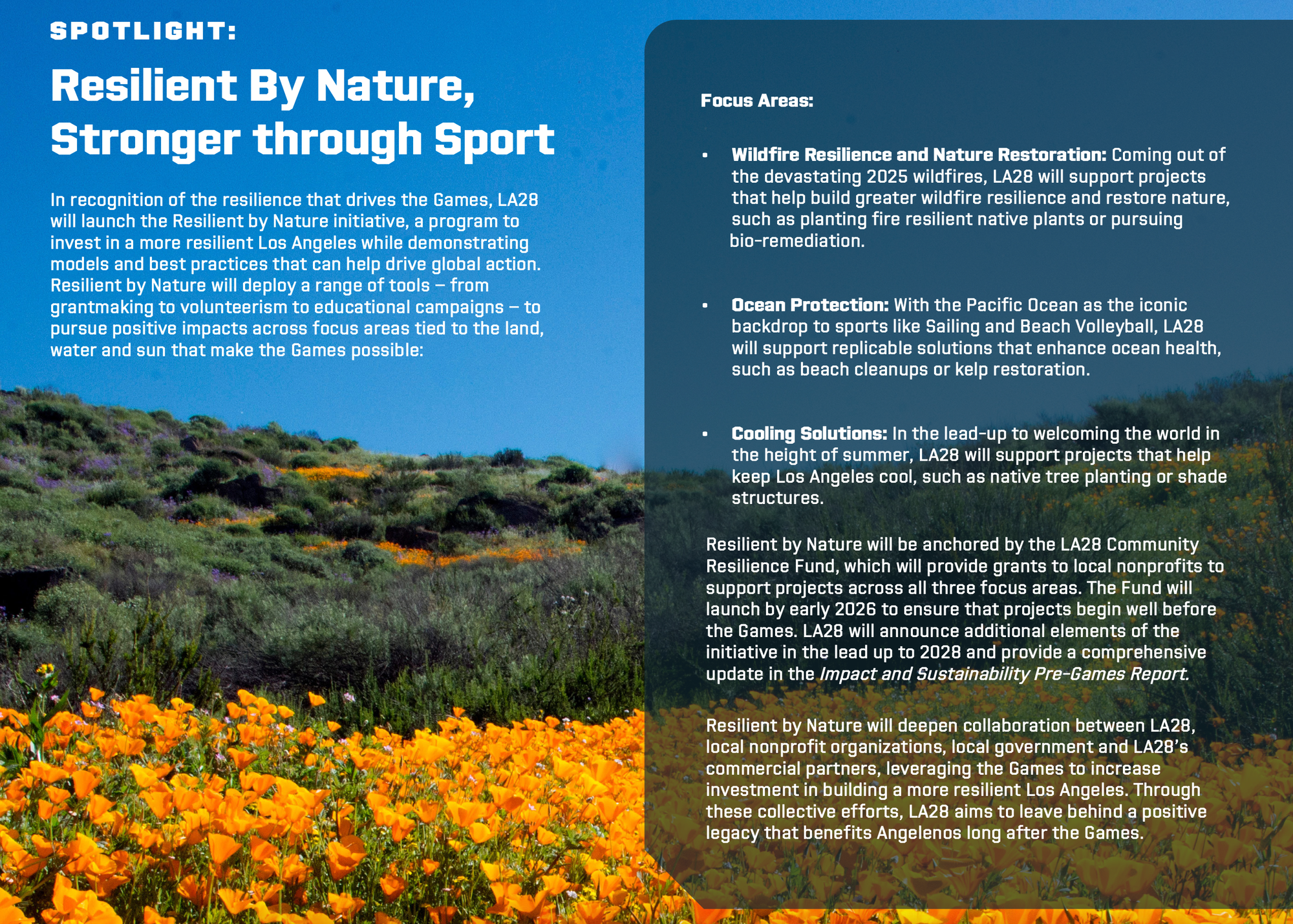How to get people excited about transit
"It will literally be your best selling t-shirt, it will get you so much PR, and if anyone interprets this inappropriately that's a them problem"
LA28's Impact and Sustainability Plan is a needed and long-overdue start, but omits more than it commits

Per the host city contract, LA28 was set to deliver a major report detailing its legacy commitments to Los Angeles on March 31, 2025. It was a deadline that came and went. And even though LA28 CEO Reynold Hoover reported to the IOC in March he had asked for an extension to "rethink and reimagine our role" after the fires, that message didn't seem to reach LA's City Council, with Councilmember Tim McOsker filing a motion on April 4 demanding an update. (To be fair, at the time he was peeved at LA28 for other issues, since resolved.)
One might argue delivering such an important report to the city 147 days late doesn't bode well for a megaevent producer with only 1,050 days to go. One also might argue a document like this should have been finalized much sooner — it's been 2,908 days since we were awarded the games. But hey, it's finally here: 62 pages of awkwardly phrased consultant-speak, all ostensibly retooled for LA's post-fire reality. Yet aside from what feel like a few tacked-on lines that acknowledge the fires occurred, there's no real evidence of a major recalibration for the *waves hands wildly in the air* that is Los Angeles in the year 2025. Instead, LA28's Impact and Sustainability Plan, which was presented to the council's ad hoc Olympic and Paralympic committee meeting on Wednesday, is a needed and long-overdue start, but omits more than it commits.
First, a little background. As a condition of the city's agreement, LA28 established working groups in 2022 in three areas of focus: community business and procurement, local hire and workforce development, and sustainability. The idea was that these working groups would be comprised of stakeholder organizations that would help inform LA28's commitments. Although council offices could recommend organizations to participate, LA28 made the final selections for who would advise them; some organizations at the time said they wanted no part in the process. In general, working group participants told me the meetings were mostly productive — you can get a peek at what those conversations were like — but one working group participant described the experience to me as exploitative, as if their expertise was meant to check an outreach box without LA28 actually engaging the community.
Now, three years later, the first detailed document about LA28's planning process hopefully leads to more public discussions. And here are the three commitments LA28 is making to you, the people of LA:

I don't need to go into too much detail about the first two commitments, which are already well underway. For economic development, LA28 is committing to spending targets that are 75 percent local businesses and 25 percent small businesses, and has been working with the city to identify and recruit those businesses. Last year, the city launched ProcureLA to provide "free services and resources to equip small businesses with the knowledge and tools needed to successfully secure contracts" — a truly great initiative if it does, in fact, do that. Business Connect does the same for diverse local businesses; here's an intake form. And LA28 already posts its contract opportunities on RAMP, the city's procurement marketplace, where they were recently searching for a provider for LA28's mascot program. (What's the version of Sam the Eagle for an autocracy?) You can hear Mayor Karen Bass and LA28 officials talk about all of this at last year's inaugural Sports & Entertainment Procurement Summit; this year's event is October 25, register here. Hanging over all these initiatives, of course, is a bigger question: will people actually come and spend their money here?
LA28's youth sports component is also already in motion as well. Starting in 2018, LA28 pledged $160 million to the PlayLA program, which LA28 says recently hit one million program enrollments. It's a lovely initiative — my kids play sports for $10 a season and learned to swim for free — but, as I've argued before, this is not really a legacy program as there is no plan (at the moment) to extend PlayLA beyond 2028. Plus this commitment seems to ignore one pretty major challenge for the program's success: LA's parks are in crisis, with inaccessible infrastructure at the very same facilities that host PlayLA's adaptive sports classes. What LA28 needs to do here is swing its global spotlight on the draft recommendations of the city's park needs assessment, which are dropping very soon.
The real news is buried in the sustainability commitments — but they're not the headlines you probably read this week. All the "no-build," "transit-first," and "radical reuse" promises that LA28 touts in the plan are pretty standard for Olympics nowadays due to IOC rules. (Although LA is now doing "transit-first-but-with-Uber-as-a-sponsor" and, as we know, LA's "no-build" promise is not exactly true.)
I'm trying to imagine what the LA version of this IOC video will be
The environmental standards LA28 aims to exceed were set by Paris — the self-anointed "greenest games ever" — which claims to have reduced carbon emissions compared to other recent Summer Olympics by 50 percent. Organizers made a big deal out of repurposing equipment and reusing temporary venue elements. Transportation impacts were certainly lessened due to Paris's ongoing car-free transformation. There was an admirable push to curb food waste. But some pledges were laughably unsuccessful: spectators expecting an elimination of single-use plastics were greeted by the astonishing sight of IOC sponsor Coca-Cola pouring plastic bottles of Coke into plastic cups.
In order to potentially improve on Paris' metrics while hosting an even larger U.S.-based event, LA28 is introducing a new idea for the games: carbon pricing. This strategy, which will incentivize lower-emission decisions across all LA28's planning, struck the right chord with Lisa Hart, executive director of LA's Neighborhood Council Sustainability Alliance, which was part of the sustainability working group, and consistently provides the best climate policy recommendations for where the city should be going. "I'm particularly excited about the adoption of an internal carbon price," she said Wednesday. "The carbon price is something we have wanted DWP and the city of LA to adopt for a long time and something other cities in the U.S. and beyond already use."
What LA28 plans to do with its new carbon-pricing money also represents a departure from previous games. A brand-new LA28 Community Resilience Fund will provide grants for local initiatives across three major focus areas: nature restoration, ocean protection, and cooling solutions. And yes, that last one includes supporting the new urban cooling initiative ShadeLA, which gets a direct shoutout in the plan.

The reasoning behind this shift was explained in a conversation with LA28's sustainability VP Becky Dale that was hosted by LA's Neighborhood Council Sustainability Alliance earlier this year. Previous games have relied on carbon offsets to bolster their low-emission claims. "There was definitely a trend of events claiming carbon neutrality and that was generally, largely due to offsets," said Dale. "Over time those pledges came to be seen as disingenuous." In fact, the IOC runs its own carbon-offset program — how convenient! — the Olympic Forest, which funds a tree-planting program in Africa that experts say is currently "facing the risk of collapse."
So, yes, of course, funding local initiatives is much better than writing a check for trees on another continent; let's plant an Olympic forest right here in LA! But LA28 doesn't have to reinvent the wheel here. At Wednesday's meeting, Emily Parker, a marine scientist from Heal the Bay, also part of the sustainability working group, noted the absence of any water-quality monitoring goals in the plan — kind of historically important for holding open-water events — and urged LA28 to "support nature-based solutions such as stormwater capture and urban greening projects" as part of its water commitment. What Parker is describing already exists as the Safe Clean Water Program — LA County voters approved this as Measure W in 2018 — which gives grants to nonprofits for projects that just so happen to deliver on all three of LA28's goals to green, clean, and cool. Do we really need LA28 to establish an entirely new grant-making and advisory structure to give this money away? LA28 could simply fund more of these thoroughly vetted projects!
But there's something else missing here. Hoover — who admits he knew nothing about LA before he moved here to take this job — reached out to native plant advocates after he was charmed by a story proposing biodiversity corridors as a 2028 legacy by Jeanette Marantos in the Los Angeles Times. A group of those advocates went to LA28 officials with a formal pitch for the largest biodiversity initiative in the history of a U.S. city: planting 500,000 native plants and 100,000 native trees, a goal for 50 percent of the landscaping around every venue to be native plants, including monarch butterfly migration waystations located at each venue (a true "invasion of butterflies," you guys!), with permanent signage identifying the species and explaining the benefits, all maintained by trained local gardeners and a volunteer corps. Now that's a vision — one that didn't make it into the final plan.
I reviewed LA28's sustainability recommendations with one of the native plant advocates familiar with the biodiversity proposal. They said the goals outlined by LA28 are "too vague and weak" and organizers "must set clear planting goals as a part of the plan or else they’ve missed the mark." On Wednesday, Hoover did say that LA28's volunteer program is launching by the end of 2025, and that, in these early stages, it will be "community-focused, not directly related to delivering the games." That resonated with this native plant advocate. "LA has thousands of gardeners and hundreds of organizations with shovels and hand pruners ready to go!" they said. "There’s still time for LA28 to lead with biodiversity as a key part of its sustainability strategy. With a bit of creative thinking, LA28 can build deep resilience — and leave a legacy for the city that hums and buzzes." 🔥